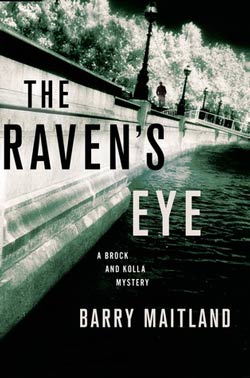 The Raven's Eye by Barry Maitland is the twelfth in the series about Scotland Yard's DCI Brock and DI Kolla, who are trying, despite the brass's interference, to investigate a mysterious death among the houseboats that line the canals around London (available November 12, 2013).
The Raven's Eye by Barry Maitland is the twelfth in the series about Scotland Yard's DCI Brock and DI Kolla, who are trying, despite the brass's interference, to investigate a mysterious death among the houseboats that line the canals around London (available November 12, 2013).
It’s almost the holidays and some parents like to use the popular Elf of on the Shelf doll to scare their children into behaving for Santa Claus. Some entrepreneur of the Hannukah-celebrating persuasion even recently started marketing a Mensch on a Bench to keep the Menoroah-lighting tykes in line. Suffice it to say, Big Brother is watching. Whether you’re naughty, nice, or somewhere in between.
In the London patrolled by Barry Maitland’s Detective Chief Inspector David Brock and Detective Inspector Kathy Kolla, it’s more likely that you’ll run into the duo if you’re on the naughty end of the spectrum. But not necessarily. For anyone who has cut their teeth on UK crime novels—or UK crime television, because why limit oneself to one medium of murder and mayhem?— it’s common knowledge that CCTV (close-circuit television for you Americans who aren’t [yet] in the know, but are already being watched [yes, I mean right now]) is nearly everywhere in Britain. While this seems like it would a) make criminals incredibly easy to catch, and b) lead to very boring crime stories, it’s actually not true. Have you ever been suckered into watching a card trick? Sure, you can watch the whole time, but you’re not seeing the whole picture because you’re not looking in the right places.
This is where Brock and Kolla come in. The Raven’s Eye starts out innocuous enough (always a telltale sign that everything, as the cops across the pond are fond of saying, is about to go tits up), with Kolla investigating a seemingly accidental death on a Thames houseboat. When it’s dead, has pink skin, and the stove is faulty, logic says carbon monoxide poisoning, not murder. But Kolla being the thorough detective that she is—and this being a crime novel and all—pokes around and discovers that not only is the victim living under a false identity but her real-life sister, Freyja, died in equally mysterious circumstances the year before, the victim of a hit and run.
Kolla and Brock’s new boss at Scotland Yard, Commander Fred Lynch, couldn’t care less about a dead girl on a boat who probably just turned the stove up to keep the heat in, closed the windows, and drifted off to Never Land. He has a priority list consisting of one item, and that one thing is the apprehension of notorious London gangster Jack “The Butcher” Bragg. Dear old Jack did not get his nickname because he owned a quality meat shop on the High Street. Commander Lynch, a generally unpleasant man who continually rubs Brock the wrong way with his insistence on reducing departmental expenses at the cost of actual police work, is also much enamored of the new technology division and the appearance of streamlining the business of solving homicides, as he tries to explain to an increasingly frustrated Brock:
In the silence that followed, Commander Lynch finally spoke. “It’s a matter of holding the line, Brock. This is an opportunity as well as a threat. It will make us leaner and smarter. The crisis [budget cuts] will force the introduction of new technologies that will transform policing, but until that happens we have to be tough enough to hold on. Are you tough enough?”
…
Brock put down the phone, frowning into his mug of coffee, still replaying in his mind his interview with the tribunal. What were these new technologies anyway? More cameras? More computers? Nothing to compare with a smart detective with a sharp eye.
And Brock is right. That’s what always makes Maitland’s series so compelling, the push and pull between the modern ways of policing, with increasingly complex surveillance equipment. At least in this installment, there's also the theoretical possibility of subdural tracking devices surgically inserted into (unwilling) criminals and (very unwilling) detectives, whose brains are attuned to catch nuances in speech and behavior, minds essentially trained to look for clues that lead to killers. Detectives are the ones who walk among us, scanning the crowds on the street, in the supermarket, in airport, and constantly play the “which one of these is not like the other?” game.
It’s too easy—and demeaning—to simply describe Brock and Kolla as “old school” coppers, because they don’t flaunt their antiquated ways and wear their resistance to change as a badge of honor. Instead, like the tortoise who will, as we all know, eventually win the race, they take their time, doing real police work, out in field, where they might get pummeled occasionally (okay, more than occasionally, since Maitland isn’t writing bloodless cozies here), but employing brains in the space between computers and cameras. Because there’s no way even the smartest microchip can know what DI Kathy Kolla can sense:
There was something troubling about this death, something that didn’t smell quite right and it wasn’t just the fog.
See more new releases at our Fresh Meat feature page.
To learn more or order a copy, visit:
Jordan Foster grew up in a mystery bookstore in Portland, Oregon. She has a MFA in Fiction Writing from Columbia University, which she’s slowly paying off as the managing editor for BookTrib.com and by writing about crime fiction for Publishers Weekly. She’s back in Portland, where it’s nice and rainy and there are endless places to stash bodies. She tweets @jordanfoster13.
Read all of Jordan Foster’s posts for Criminal Element.
